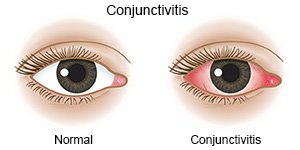Conjunctivitis
Medically reviewed by Drugs.com. Last updated on Aug 4, 2025.
Conjunctivitis, or pink eye, is inflammation of your conjunctiva. The conjunctiva is a thin tissue that covers the front of your eye and the back of your eyelid. The conjunctiva helps protect your eye and keep it moist. The most common cause of conjunctivitis is infection with bacteria or a virus. Allergies or exposure to a chemical may also cause conjunctivitis. Conjunctivitis is easily spread from person to person.
 |
DISCHARGE INSTRUCTIONS:
Return to the emergency department if:
- You have worsening eye pain.
- The swelling in your eye gets worse, even after treatment.
- Your vision suddenly becomes worse, or you cannot see at all.
Call your doctor if:
- Your start to notice changes in your vision.
- You develop a fever and ear pain.
- You have tiny bumps or spots of blood on your eye.
- You have questions or concerns about your condition or care.
Medicines:
You may need any of the following:
- Allergy medicine helps decrease itchy, red, swollen eyes caused by allergies. It may be given as a pill, eye drops, or nasal spray.
- Antibiotics may be needed if your conjunctivitis is caused by bacteria. This medicine may be given as a pill, eye drops, or eye ointment.
- Take your medicine as directed. Contact your healthcare provider if you think your medicine is not helping or if you have side effects. Tell your provider if you are allergic to any medicine. Keep a list of the medicines, vitamins, and herbs you take. Include the amounts, and when and why you take them. Bring the list or the pill bottles to follow-up visits. Carry your medicine list with you in case of an emergency.
Manage your symptoms:
- Apply a cool compress. Wet a washcloth with cold water and place it on your eye. This will help decrease itching and irritation.
- Use artificial tears. This will help lessen your symptoms, including itching or irritation.
- Do not wear contact lenses until treatment is complete and your symptoms are gone.
- Flush your eye. You may need to flush your eye with saline to help decrease your symptoms. Ask for more information on how to flush your eye.
Treatment options
The following list of medications are related to or used in the treatment of this condition.
Prevent the spread of conjunctivitis:
- Wash your hands with soap and water often. Wash your hands before and after you touch your eyes. Wash your hands after you use the bathroom, change a child's diaper, or sneeze. Wash your hands before you prepare or eat food.

- Avoid contact with others. Do not share towels or washcloths. Try to stay away from others as much as possible. Ask when you can return to work or school.
- Avoid allergens and irritants. Try to avoid the things that cause your allergies, such as pets, dust, or grass. Stay away from smoke filled areas. Shield your eyes from wind and sun.
- Throw away eye makeup. Bacteria can stay in eye makeup. Throw away your current mascara and other eye makeup. Never share mascara or other eye makeup with anyone.
Follow up with your doctor as directed:
You may be referred to an ophthalmologist for treatment. Write down your questions so you remember to ask them during your visits.
© Copyright Merative 2025 Information is for End User's use only and may not be sold, redistributed or otherwise used for commercial purposes.
The above information is an educational aid only. It is not intended as medical advice for individual conditions or treatments. Talk to your doctor, nurse or pharmacist before following any medical regimen to see if it is safe and effective for you.
Learn more about Conjunctivitis
Treatment options
Care guides
Symptoms and treatments
Further information
Always consult your healthcare provider to ensure the information displayed on this page applies to your personal circumstances.
